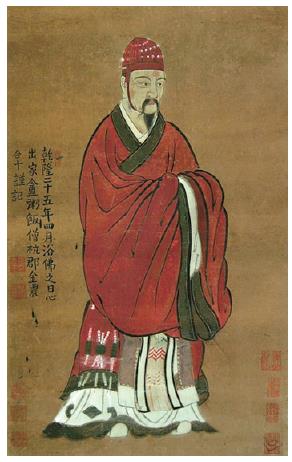동북아역사재단 2018년 01월호 뉴스레터
- Lee You-pyo (Research fellow, NAHF Research Institute of Korea-China Relations)

“For such a small country to have military success without the virtues of a sage, there can be no greater misfortune! What can we do but become subjugated should the people of Chu attack us? And that is sure to set the armed forces of Jin upon us."
Just like the boy said, Chu and Jin one by one attacked Zheng and threw the state into turmoil. Twenty years later, that boy became the high minister of Zheng. Zichan (子産) was the name of the boy who grew up to be a well-known politician and philosopher of the Spring and Autumn period. Zichan was his courtesy name (字), while his original name was Gongsun Qiao (公孫僑), the grandson of Duke Mu (鄭穆公). Autonomous diplomacy seemed impossible for Zheng stuck in a dilemma of being unable to side with Chu nor Jin. Nevertheless, Zichan made the impossible possible by carrying out reforms in handling domestic affairs.
Introducing Virtues Through Reforms
As soon as he became high minister, Zichan started carrying out land reform. He had irrigation ditches be made in fields to mark perimeters and arranged for land the nobility had extorted to be returned to their original owners. He simultaneously carried out military reforms so that commoners became required to participate in military service, which had previously been a privilege enjoyed only by the nobility. Such reforms strengthened the economy and military might of Zheng, politically and socially kept the nobility in check, and improved the social status of commoners.
The ultimate achievement of Zichan's domestic reforms was the proclamation of a penal code. By engraving the code on a bronze ding to be displayed in public, Zichan tried to make sure people were aware that a code of law existed and to prevent the nobility from abusing their privileges or interpreting the code to their advantage. Of course, it was not a measure initially welcomed by everyone. Some would gather at institutions called xiangxiao (鄕校) in each village to express their resentment toward Zichan and even curse him. Others who heard of this told Zichan to get rid of xiangxiao. However, Zichan was strongly against the idea and argued that xiangxiao could offer lessons helpful for keeping up practices that gained compliments for politicians and correcting practices that earned them criticism. This strict yet lenient style of government eventually won the people of Zheng over and made them accept the impartial application of law by Zichan.
Defending National Pride with Autonomous Diplomacy
When it became difficult for Zheng to choose a diplomatic course of action from being stuck between the two powerful states Jin and Chu, Zichan as high minister kept Zheng safe by taking the course of remaining friendly with Jin, but feeding Chu's ego from time to time. Yet, Zichan wasn't always accommodating toward Jin. He would never sacrifice the interests and pride of Zheng, not even to appease Jin. This can be noticed from the two examples presented below.
In 542 B.C., Zichan accompanied the Zheng ruler Duke Jian (鄭簡公) on a trip to Jin. When the king of Jin used the decease of the prince of Lu as an excuse not to grant Duke Jian and his entourage an audience, Zichan knocked down the wall around the guest house and had all the wagons and horses come into the front yard. This caused Jin minister Shi Wenbo (士文伯) to protest, to which Zichan replied:
"At your invitation, we prepared precious gifts in order to meet your king, but since you tell us you don't have the time to meet and refuse to fix a date for an audience, the gifts we brought are all rotting outside from wind and rain ... While your king resides in such a splendid grand palace, this guest house is like a theater in a shabby alley so narrow that wagons and horses can hardly pass ... The wall had to come down for us to be able to preserve these gifts."
At these words, Jin could not help but admit its negligence toward its guests and treated Duke Jian and his entourage with the utmost respect.
Later in 526 B.C., while having an audience with Duke Jian, Han Xuanzi (韓宣子), the high minister of Jin, asked for a jade ring in the possession of a Zheng merchant. It was a somewhat trivial request, but Zichan immediately refused by telling Han Xuanzi that "our king does not recognize the ring since it is not in the government's possession." Zichan had figured that granting such a trivial wish may allow the greedy Jin to make even more extravagant demands in the future.
Although he was the high minister of a small, weak state, Zichan managed to introduce virtues to Zheng through domestic reforms and practiced autonomous diplomacy so as to defend the state's pride and prevent powerful neighboring states from disrespecting Zheng.


